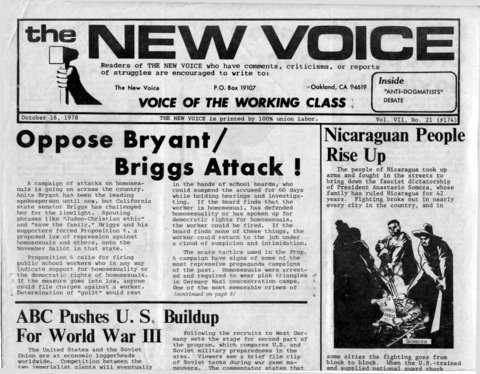
Published: The New Voice, Vol. VII, No. 21, October 16, 1978.
Transcription, Editing and Markup: Paul Saba
Copyright: This work is in the Public Domain under the Creative Commons Common Deed. You can freely copy, distribute and display this work; as well as make derivative and commercial works. Please credit the Encyclopedia of Anti-Revisionism On-Line as your source, include the url to this work, and note any of the transcribers, editors & proofreaders above.
Two members of the so-called anti-dogmatist trend in the communist movement – Irwin Silber, co-owner of the Guardian newspaper, and Clay Newlin of the Philadelphia Workers Organizing Committee (PWOC) – carried their traveling debate on party-building to San Francisco and Los Angeles in mid-September. The debate was first held in New York City.
Newlin spoke for the idea of “fusion.” Originally, this meant that communists should go out to mass movements and recruits lots of advanced workers to local groups, which only then could found a communist party. This conception was criticized five years ago in The Struggle for the Party, by Charles Loren. During the debate in San Francisco, Newlin made the idea of fusion into something fuzzier. He now declares it to mean that his people must achieve a “vanguard relationship with the working class in an embryonic form” before the party can be established.
In matters of theory, Newlin bewailed the alleged lack of theoretical work in the United States on the class composition of this society, on racism and on monopoly capital. He did not criticize the theoretical work done on these subjects by The New Voice or others. In general, Newlin felt that theory develops out of experience in the class struggle today. In small, alternating steps, communists should do mass work, elaborate some theory, do some more mass work, etc.
Silber placed more emphasis on “rectifying the general political line” of the Communist Party USA and the Communist Party (Marxist-Leninist), both of which he labeled revisionist.
The two anti-dogmatists thus split apart the relation of theory and practice. By not mentioning the need to defend the universal truths of Marxism-Leninism, Newlin endorsed the view that all theory comes out of the most recent, direct practice of activists in current reform struggles. This is false. New experience must be summed up, but the class nature of the state, the need for violent revolution and the dictatorship of the proletariat are key questions to understand and propagate before a revolution in the United States. The experience on these questions comes from the blood spilled by workers in many previous revolutions, both successful (such as October 1917 and China) and unsuccessful (such as the Paris Commune and Germany in 1918).
Silber appears to defend an anti-revisionist line, but he never really expounded it. He called for maintaining the idea of the “seizure of state power.” This phrase, which the Guardian has employed in the past (see TNV, June 28, 1976), is a poor one to use when discussing this basic question. In a revolution the working class needs to smash the capitalist state machine, not seize it. Then we must build a new state, the dictatorship of the proletariat. In the old Second International at the turn of the century, Karl Kautsky talked about the “seizure of state power” in opposition to Bernstein’s view that reforms would gradually achieve socialism by themselves. Bernstein was a revisionist–and so was Kautsky, who merely wanted to accumulate votes for social-democrats and persuade the capitalists to let the social-democrats manage the capitalist state.
Silber also confined his criticism of the Soviet Union to “great power chauvinism, revisionism and narrow nationalism.” He refused to indict the Soviet social-imperialists. This is because Silber is a publicity agent for the Soviet rulers’ colonial agents and clients like Fidel Castro, the MPLA in Angola, and the Vietnamese leaders. He refers to the Soviet Union in terms that cover up the relation of these clients to the new imperialist master.
Both the Guardian and the PWOC are drifting away from party-building in practice. The Guardian has its Guardian clubs, which are expected to take some direction from the Guardian and support it financially, although the Guardian is not a democratic centralist organization but only a newspaper. Members of the Guardian clubs belong simultaneously to political organizations like the Northern California Alliance, a split from the social-democratic New American Movement. The PWOC has united with other local groups in an Organizing Committee for an Ideological Center, a loose conglomeration of local, democratic centralist groups. Silber charged that the OC is federationist rather than centralist and thus likely to lead to factionalism.
The debate was barren of current, concrete issues. In San Francisco, not one current mass struggle in the U.S. was discussed. The PWOC did not give any examples of fusion work.
Neither speaker illustrated questions of revolutionary line, methods or style of work in the U.S. concretely.
In fact, the debate was a fantasy world when compared to the actual content of the left-liberal Guardian, for example. Part of the audience began drifting out early, while the remainder traced the sparring for leadership of an amorphous trend. The “anti-dogmatist” trend is no home for revolutionaries.